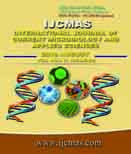


 National Academy of Agricultural Sciences (NAAS)
National Academy of Agricultural Sciences (NAAS)

|
PRINT ISSN : 2319-7692
Online ISSN : 2319-7706 Issues : 12 per year Publisher : Excellent Publishers Email : editorijcmas@gmail.com / submit@ijcmas.com Editor-in-chief: Dr.M.Prakash Index Copernicus ICV 2018: 95.39 NAAS RATING 2020: 5.38 |
The present study was conducted to evaluate bacterial endophytes against Pythium spp. causing soft rot of ginger. Water soaked lesions at the emerging base and the collar region was the typical symptoms observed on infected plants. Sprout appeared pale yellowish and withering off of plant was seen and such rhizomes were rotten and emitted foul smell in which diseased plants came off with a gentle pull. Six potential bacterial endophytes viz., Alcaligenes sp. (GE-1), Bacillus cereus (GE-2), Bacillus sp. (GE-3), Bacillus sp. (GE-4), Bacillus sp. (GE-5), Bacillus thuringiensis (GE-6) were evaluated by dual culture assay and endophytes were successful in inhibiting the mycelial growth of the Pythium sp. causing soft rot of ginger. Of which, Alcaligenes sp. (GE-1) showed highest per cent inhibition of 80.98% followed by Bacillus sp. (GE-4) and Bacillus sp. (GE-5) of 78.89% and 77.33% inhibition respectively. The least inhibition was observed in Bacillus sp. (GE-3) with 64.89%. In vitro evaluation found that four isolates were highly effective as it gave more than 70% inhibition in growth of Pythium spp. Therefore these isolates can be used in consortia mode in field condition against ginger soft rot.
 |
 |
 |
 |
 |